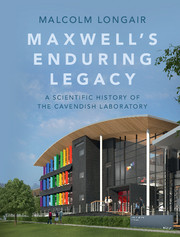Book contents
- Frontmatter
- Dedication
- Contents
- Preface
- Acknowledgements
- Part I To 1874
- Part II 1874 to 1879
- 3 The Maxwell era
- Part III 1879 to 1884
- Part IV 1884 to 1919
- Part V 1919 to 1937
- Part VI 1938 to 1953
- Part VII 1953 to 1971
- Part VIII 1971 to 1982
- Part IX 1984 to 1995
- Part X 1995 to present
- Appendix The evolution of the New Museums site
- Notes
- References
- Author index
- Subject index
3 - The Maxwell era
from Part II - 1874 to 1879
Published online by Cambridge University Press: 05 July 2016
- Frontmatter
- Dedication
- Contents
- Preface
- Acknowledgements
- Part I To 1874
- Part II 1874 to 1879
- 3 The Maxwell era
- Part III 1879 to 1884
- Part IV 1884 to 1919
- Part V 1919 to 1937
- Part VI 1938 to 1953
- Part VII 1953 to 1971
- Part VIII 1971 to 1982
- Part IX 1984 to 1995
- Part X 1995 to present
- Appendix The evolution of the New Museums site
- Notes
- References
- Author index
- Subject index
Summary
The appointment of James ClerkMaxwell
The electors to the Cavendish Professorship of Experimental Physics naturally sought the best possible candidate for the new chair. The obvious first choice was Sir William Thomson, later to become 1st Baron Kelvin of Largs or the Lord Kelvin, who was regarded as the most distinguished British physicist of his day, both in theory and in experiment. As described in Section 1.4.4, he was knighted for his efforts in laying the first successful transatlantic submarine cable in 1866. With his new, well-furnished laboratory at the University of Glasgow and his excellent industrial and domestic arrangements in the area, it is not surprising that he was unwilling to leave Glasgow. Another factor in Thomson's decision was the absence in Cambridge of a network of instrument makers and industrialists upon which much of his work relied. It is said that the electors also tried to attract Hermann von Helmholtz from Germany, but he was too well established in Berlin to consider moving to Cambridge. Some measure of the ambitions of the electors to the Cavendish Chair is provided by the assessment of Helmholtz's stature by R. Steven Turner:
Helmholtz witnessed the final transition of the German universities from purely pedagogical academies to institutes devoted to organised research. The great laboratories built for him at Heidelberg and Berlin opened to him and his students possibilities for research unavailable anywhere in Europe before 1860. In many respects his career epitomised that of German science itself in his era, for during Helmholtz's lifetime German science, like the German empire, gained virtual supremacy on the Continent. (Turner, 1970)
Next, they turned to Maxwell. Maxwell's health was always somewhat fragile and, after a bout of ill-health, he resigned his chair at King's College, London in 1865. He returned to manage the family estate at Glenlair in the Dumfries and Galloway region of southern Scotland and set about writing his monumental Treatise on Electricity and Magnetism, which was eventually published in two volumes in 1873 (Maxwell, 1873). Maxwell was well known in Cambridge and no one doubted his originality and brilliance.
- Type
- Chapter
- Information
- Maxwell's Enduring LegacyA Scientific History of the Cavendish Laboratory, pp. 49 - 76Publisher: Cambridge University PressPrint publication year: 2016



